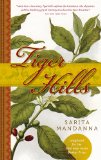Summary | Excerpt | Reviews | Beyond the Book | Readalikes | Genres & Themes | Author Bio

A Novel
by Sarita Mandanna
She did, however, once. After the ritual forty days of cleansing were over, when Muthavva untied the cloths bound tight about her abdomen, arose from the birthing bed, and was deemed able to perform her household duties once more, the family took the baby to the village temple to have her horoscope drawn. The old priest reached for his manuscript of tattered pipal leaves, wrapped in orange silk and passed down through generations from father to son. The child would have marriage, he predicted, and progeny. Money was in her fate too. But... and here he fell silent. Muthavva and Thimmaya looked anxiously at one another. "What is it, ayya? What do you see?" Thimmaya's mother asked, anxiously clutching the baby closer until she squirmed in protest.
"Nothing... it is nothing... and yet... " The priest fell silent once again and consulted his leaves. He looked up at the worried faces around him, as if debating what to say. "It is nothing," he said finally, even as he fished about in a dilapidated wooden box. "Here." He pulled out an amulet. "This will protect her." The amulet had a powerful mantra inscribed upon it, he advised; it would protect her from the evil eye. Better she wear it at all times. Shushing their concerns, he smeared vermilion on their foreheads and tied the amulet around the baby's arm with black thread. They touched the feet of the priest and prostrated in front of the idol. They had made their way outside, blinking in the sudden sunlight when, exclaiming that her earring was missing and that it must have fallen off during the reading, Muthavva hurried back inside.
"Ayya?" she called softly, her eyes taking a minute to adjust to the cool darkness of the sanctum sanctorum. The priest was clearing away the debris from their pooja, and he looked up, mildly irritated.
"Yes child, what is it now?"
She told him about the birds she had seen that day, the unnerving precision of their maneuvers, as if they had come to herald the baby's birth. What did it mean? What had he seen in the leaves? Was there something he had not told them, some awful fate that awaited her daughter?
The old man sighed. Who could say what they meant, the birds? It was said that when a king cobra happened upon a sleeping man and instead of sinking its fangs into his flesh, fanned its hood instead, to shelter him from the sun, then that man would someday be king. The herons... maybe they foretold something, maybe they did not. Who could read the mind of God? When Thimmaya went to see Pallada Nayak the next day on his way back to the outpost, the Nayak generously excused him from the remainder of his lookout duty. It was only fair to Muthavva, he said, and besides, it was sowing season, and Thimmaya had another mouth to feed. The Nayak would send his youngest son in Thimmaya's place.
The paddy that year was so bountiful that Thimmaya was able to buy two milch cows with the gold it fetched him; the cardamom prices were the highest they had been in six years. The family sacrificed a rooster to the ancestors for blessing them with a daughter who brought with her such good fortune. They named her Devamma, after Thimmaya's great-grandmother, but called her Devi, their very own Goddess.
Muthavva never entirely forgot the herons. She kept the amulet firmly tied around her daughter's arm, surreptitiously scanning the skies each time she took the baby outdoors. As the months passed, however, and nothing untoward happened, she relaxed her vigil. The birds had been a figment of her imagination, she told herself, the phantasms of a pregnant woman. She was entirely too preoccupied to notice them the night of Gauramma's wedding. The village had been abuzz for weeks. It was an excellent match; Pallada Nayak's daughter was marrying the third son of Kambeymada Nayak, from the village that lay two hundred furlongs to the south. The latter was one of the wealthiest men in Coorg, with fifteen hundred acres of wetlands, several hundred more of cardamom country, and multiple coffee estates. Even his tobacco spittoon, it was rumored, was made of solid gold. Nobody had actually seen the spittoon but then which Coorg in his right mind would openly display such treasures for the Poleya servants to covet? Besides, hadn't the old man commissioned a fabulous walking stick just this past month in Mercara, carved from the finest rosewood and inlaid with ivory? Ah, the village concurred, it was a lucky girl who entered the Kambeymada family, and who better than their own gentle Gauru?
Excerpted from Tiger Hills © Copyright 2011 by Sarita Mandanna. Reprinted with permission by Grand Central Publishing. All rights reserved.
Your guide toexceptional books
BookBrowse seeks out and recommends the best in contemporary fiction and nonfiction—books that not only engage and entertain but also deepen our understanding of ourselves and the world around us.